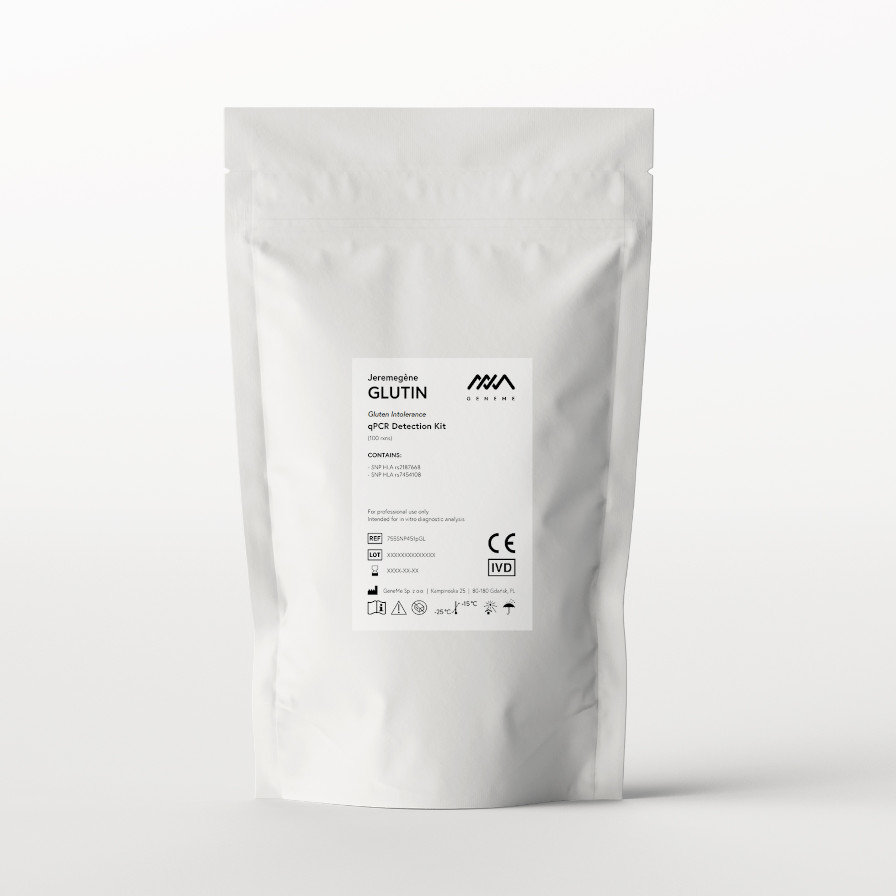GLUTIN
(Coeliac Disease)
qPCR Detection Kit

Description
The HLA gene group encodes proteins that are involved in the excessive immune response of the human body to gluten. The result of this action is inflammation and, as a result, damage to the intestinal mucosa. The HLA-DQ protein is composed of two subunits - alpha and beta. There are many versions of the beta and alpha subunit that are components of the different variants of the HLA-DQ protein. People with coeliac disease usually have one of three protein variants - HLA-DQ2.5, HLA-DQ2.2, or HLA-DQ8. HLA-DQ2.5 is expressed in over 90% of those with coeliac disease.
REF. NUMBER
755SNP451pGL
PREDISPOSITION
Coeliac Disease
ANALYSED GENES
HLA-DQA1, HLA-DQB1
IDENTIFIED POLYMORPHISMS
DQA1*05, DQB1*02
KIT CONTENTS
2 × Nuclease-Free Water
2 × 2xMasterMix Probe
2 × Oligos Set
2 × Positive Control
QUANTITY
100 rxns
STORAGE CONDITIONS
-25°C to -15°C
CERTIFICATES
More Information
Did you know...?
Up to 80 million people worldwide are diagnosed with gluten intolerance. Every year this number increases. A proven method of assessing your gluten tolerance is a gastroscopy with excision of the sample needed for analysis. Another option is a non-invasive genetic test – all you need is a cheek swab or a saliva sample.
Why is it important to know about gluten intolerance?
Undiagnosed coeliac disease causes severe abdominal pain, diarrhea, constipation, intestinal cramps, feeling of overflowing, reflux, gas. In addition, it destroys the intestinal villi, causing their complete disappearance. It prevents the absorption of nutrients, therefore causes a decrease in weight, deficiencies of many extremely important substances.
How the test is performed?
The HLA-DQ2.5 genes are responsible for gluten tolerance. Alleles analysis using our reagents is fast and accurate. Thanks to the IFU instructions included in the kit, the technician can easily interpret the results. The reaction lasts about 2 hours, and the temperature-time profile is selected so that the laboratory can analyze several genes simultaneously using one device. Ready-to-use reagents are included in the kit. It is enough for the lab technician to add each of them in the right proportion and the reaction is ready. Quickly, easily and professionally.
Why is it worth doing a genetic test?
The test allows you to avoid the painful procedure of gastroscopy or colonoscopy. Most (if not all) patients will choose the non-invasive option. People want to know as much as possible about themselves and be aware of the risks. This will allow them to prepare or avoid many problems. The study of gluten intolerance will give them information on how to eat or what to avoid.
What can be done after the test result?
A professional approach to the client will inspire his trust and ignite the desire to learn about other genes. Without the need for sequencing, you can access information about many DNA fragments that affect key parameters of our lives. From our genome we can learn about other intolerances and predispositions that often occur simultaneously with gluten intolerance. That is why the client often comes back for a new dose of self-knowledge.